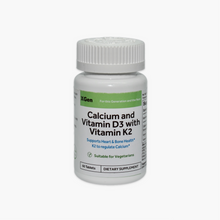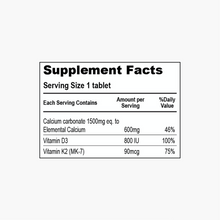- 60 Tablets
- D3 for better Calcium absorption.
- Vitamin K2 to regulate Calcium & prevent calcification in arteries.
-
Fine balance on the Calcium intake
Additional Information
Features:
- Our product has been formulated for optimum absorption of Calcium with vitamin D3.
- Addition of vitamin K2 is to help move Calcium into the proper areas in your body, such as your bones and teeth.
- Vitamin K2 also helps remove Calcium from areas where it shouldn’t be, such as in your arteries and soft tissues for a healthy heart.
Calcium:
According to the USDA 2010 guidelines for Americans, Calcium is one of the four major nutrients adults and children consistently do not get enough of. Your body can store calcium, but it can’t produce it. That’s why you must get the calcium you need from foods, beverages, and dietary supplements. Here is the Calcium Paradox;

You need a fine balance on your Calcium intake. Consuming adequate calcium throughout life may reduce the risk of osteoporosis, a disorder that affects more than 10 million American adults, of whom 80% are women.
Calcium absorption is highest during periods of intense growth, such as childhood and pregnancy, as rapidly growing bones spur the high demand for the mineral. With the exception of pregnancy, calcium absorption starts decreasing during adulthood and continues to decrease with age.
The first few years after menopause begins mark rapid calcium loss from bones in women. Estrogen production decreases, which causes more bone breakdown and decreased calcium absorption from foods and dietary supplements. Recommended calcium consumption increases for women at age 51, the time menopause typically starts.
You can get Calcium from;
- Dairy products, such as cheese, milk and yogurt.
- Dark green leafy vegetables, such as broccoli and kale.
- Fish with soft bones that you can eat, such as sardines and canned salmon.
Vitamin D3:
Vitamin D is a fat-soluble vitamin that helps your body absorb calcium and phosphorus. Having the right amount of vitamin D, calcium, and phosphorus is important for building and keeping strong bones.
Your body must have vitamin D to absorb calcium and promote bone growth. Too little vitamin D results in soft bones in children (rickets) and fragile, misshapen bones in adults (osteomalacia). You also need vitamin D for other important body functions.
In its active form as calcitriol, vitamin D contributes to skin cell growth, repair, and metabolism. It optimizes the skin's immune system and helps destroy free radicals that can cause premature aging. While the body can produce vitamin D on its own through sun exposure, too much sun accelerates skin aging.
Here are 8 signs and symptoms of vitamin D deficiency;
- Getting Sick or Infected Often. ...
- Fatigue and Tiredness. ...
- Bone and Back Pain. ...
- Depression. ...
- Impaired Wound Healing. ...
- Bone Loss. ...
- Hair Loss. ...
- Muscle Pain.
Vitamin K2:
Vitamin K2 is an important fat-soluble vitamin that plays critical roles in protecting your heart and brain, and building strong bones. It also plays an important role in cancer protection
The biological role of vitamin K2 is to help move calcium into the proper areas in your body, such as your bones and teeth. It also helps remove calcium from areas where it shouldn’t be, such as in your arteries and soft tissues.
The optimal amounts of vitamin K2 are still under investigation, but it seems likely that 180 to 200 micrograms of vitamin K2 might be enough to activate your body’s K2-dependent proteins to shuttle calcium to the proper areas.
If you take oral vitamin D, you also need to take vitamin K2. Vitamin K2 deficiency is actually what produces the symptoms of vitamin D toxicity, which includes inappropriate calcification that can lead to hardening of your arteries.
If you take a calcium supplement, it’s important to maintain the proper balance between calcium, vitamin K2, vitamin D, and magnesium. Lack of balance between these nutrients is why calcium supplements have become associated with increased risk of heart attack and stroke.



